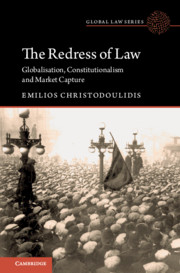Book contents
- Reviews
- The Redress of Law
- Global Law Series
- The Redress of Law
- Copyright page
- Dedication
- Contents
- Acknowledgements
- Introduction
- Part I Political Phenomenology
- Part II Political Constitutionalism
- Part III Market Constitutionalism
- 3.1 Market Trajectories
- 3.2 Total Market Thinking
- 3.3 Europe’s ‘Social Market’ and the Disembedding of Labour Protection
- 3.4 The Deep Commodification of Labour
- Part IV Strategies of Redress
- Epilogue
- References
- Index
3.1 - Market Trajectories
from Part III - Market Constitutionalism
Published online by Cambridge University Press: 26 March 2021
- Reviews
- The Redress of Law
- Global Law Series
- The Redress of Law
- Copyright page
- Dedication
- Contents
- Acknowledgements
- Introduction
- Part I Political Phenomenology
- Part II Political Constitutionalism
- Part III Market Constitutionalism
- 3.1 Market Trajectories
- 3.2 Total Market Thinking
- 3.3 Europe’s ‘Social Market’ and the Disembedding of Labour Protection
- 3.4 The Deep Commodification of Labour
- Part IV Strategies of Redress
- Epilogue
- References
- Index
Summary
A long tradition of social theory that includes Durkheim and Parsons, tells the story of the advent of modernity as a story of the shift towards a differentiation of functional domains. For Luhmann, ‘[t]he evolution of this highly improbable social order required replacing stratification with functional differentiation as the main principle of forming subsystems within the overall system of society’ (Luhmann, 1986b: 318). Modernity was marked by a new configuration of the nature of the social bond as a type of solidarity that Durkheim termed ‘organic’, and correlative to a new division of labour and pluralisation of value spheres. The differentiation has to do with the gradual autonomisation of spheres and logics of social action, the development of separate semantics for the differentiated fields, and with their principle of linkage – ‘solidarity’ in Durkheim – being largely reconceptualised in the process.
- Type
- Chapter
- Information
- The Redress of LawGlobalisation, Constitutionalism and Market Capture, pp. 297 - 326Publisher: Cambridge University PressPrint publication year: 2021

